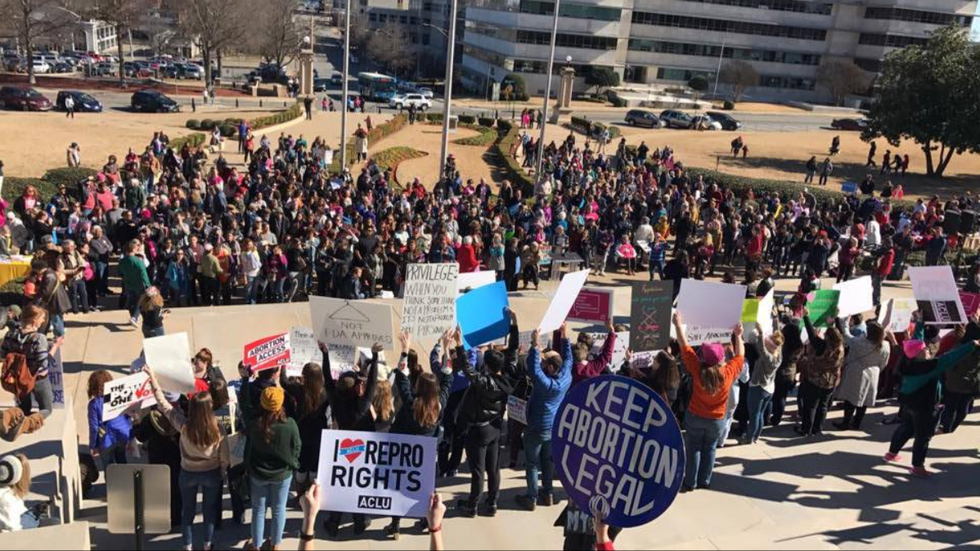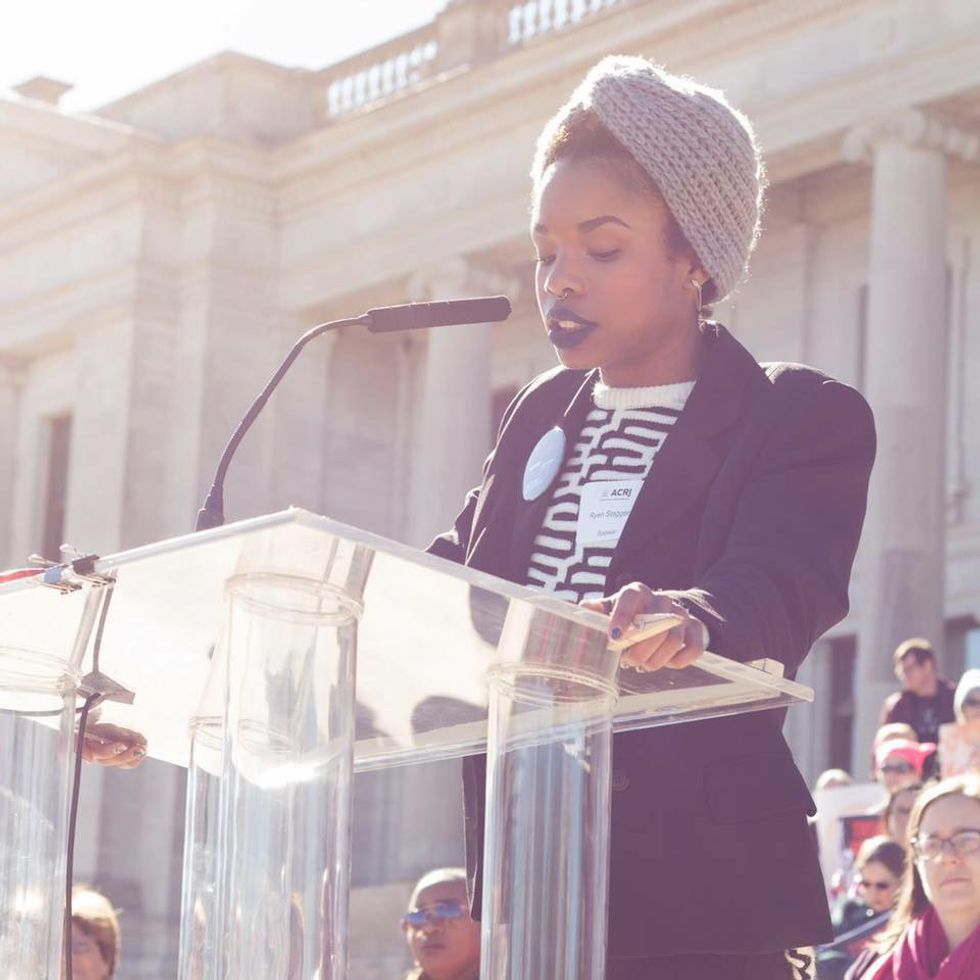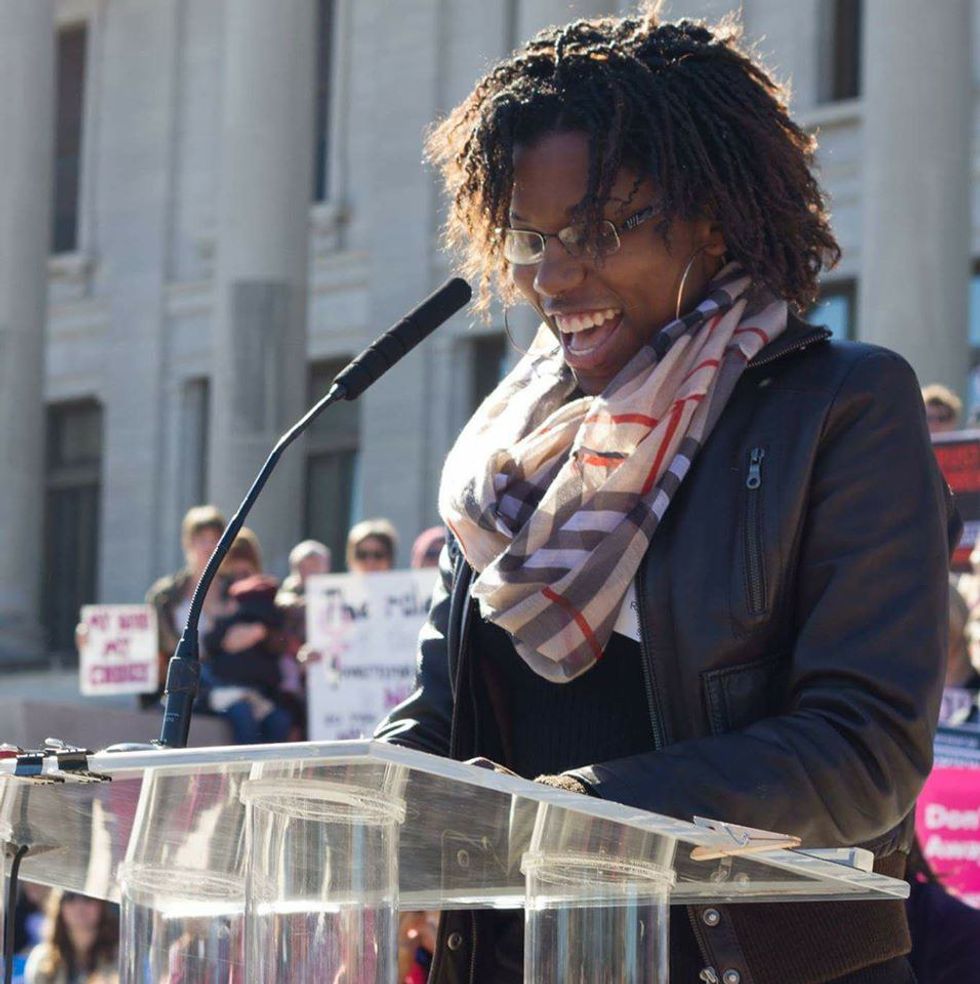On January 28, over 700 people gathered around the steps of the Arkansas State Capitol in Little Rock for the 7th Annual Rally for Reproductive Justice.
Organized by the Arkansas Coalition For Reproductive Justice, the rally is held annually in order to commemorate the anniversary of Roe v. Wade, a significant case in the history of reproductive justice which ruled that denying a person’s right to terminate a pregnancy is unconstitutional under the 14th Amendment.
This year’s rally also addressed concerns about current state and federal legislation limiting reproductive health care, including Donald Trump’s reinstatement of the Global Gag Rule which restricts abortions on an international level. In addition, Arkansas’s own Governor Asa Hutchinson signed HB1032 the day before the rally–a bill that bans the safest and most common medical procedure for terminating a second trimester pregnancy in the state of Arkansas.
Senator Joyce Elliott spoke as the rally’s emcee, introducing a lineup of guest speakers who represented a few of the diverse and multifaceted groups affected by reproductive justice. Included in this lineup were Ryen Staggers, a member of UALR’s Odyssey team and the Outreach Chair for the Arkansas Coalition For Reproductive Justice, who spoke at the rally on campus sexual assault and highlighted the importance of reproductive rights for assault survivors.
The first guest to speak was co-founder of Black Lives Matter Little Rock and deputy director of the Arkansas Transgender Equality Coalition, local organizer Rae Nelson. Nelson began by stressing the importance of eradicating the harmful and inaccurate association between genitalia and gender identity that has long alienated the transgender community from the reproductive justice movement. The only transgender speaker at the rally, as well as the first black transgender woman to speak at an Arkansas Rally For Reproductive Justice, Nelson immediately accomplished what many at the rally could not: discuss the impact of reproductive rights while maintaining language and rhetoric inclusive of all affected groups.
Speaking to an audience made up of largely white cisgender women, Nelson gives gratitude to Henrietta Lacks (a black woman whose cancer cells were taken from her body without her consent or knowledge and used in research as one of the most important cell lines in medical history without ever granting compensation to her family) and other black women who have had their privacy rights and bodily autonomy violated in the name of the white scientific community's achievements. She then discusses the restrictions on reproductive justice that transgender women face, including sterilization from gender-reassignment surgery (GRS). Nelson notes that in order for her to correct the sex on her birth certificate, she is required by law to provide proof that she has received gender-reassignment surgery: a procedure that results in sterilization and completely destroys the possibility of ever having biological children.
There are currently 37 states, including Arkansas, that require transgender individuals to submit documentation proving they received gender-reassignment surgery in order to correct the sex on their birth certificate. Not only are there many transgender individuals who would prefer not to undergo GRS, Nelson explains, but the procedure is very costly and offered in few states. The requirement of an inaccessible and sterilizing procedure in conjunction with the high cost of sperm storage is a huge hurdle when it comes to attaining reproductive rights and bodily autonomy for transgender women.
In addition, Nelson calls for attendees to expand discussions about pregnancy, abortion, birth control, and other reproductive issues commonly associated with cisgender women to include transgender men and gender binary nonconforming individuals who are also affected. However, many of the other speakers, including Senator Joyce Elliott, still made remarks that appeared to reside on the assumption that the ability to get pregnant is a characteristic of womanhood, even after Nelson stated that not all women can get pregnant and not all people who get pregnant are women.
“The bill that we just passed on Thursday gives no exception for somebody who has survived a sexual assault, and has gotten pregnant, and would like to exercise the option and decide for herself whether or not she gives birth to a child because of a sexual assault,” said Senator Elliot.
In addition to Ryen Staggers and Rae Nelson, UAMS student Camille Richoux and Karen Musick from the Arkansas Abortion Support network also appeared at the rally as guest speakers. They each spoke on various topics related to reproductive justice, including their personal experiences, with an invocation led by Reverend Carissa Rodgers from Black Lives Matter and the Quapaw Quarter United Methodist Church.
The Arkansas Coalition For Reproductive Justice defines “reproductive justice” as “The right to HAVE children, the right to NOT HAVE children and the right to PARENT the children we have in SAFE and HEALTHY ENVIRONMENTS”, and have adopted this definition from the work of organizations Sister Song and Trust Black Women.
EDIT: New information suggests that Tiommi Luckett, board member of the Arkansas Transgender Equality Coalition and a prominent southern grassroots activist, was invited last year to speak at the Arkansas Rally For Reproductive Justice but had to cancel unexpectedly, making her the first black trans woman to have been invited. Her achievements deserve credit here.






















